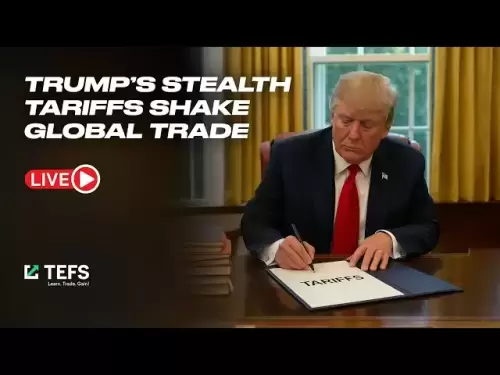-
 Bitcoin
Bitcoin $115200
-2.68% -
 Ethereum
Ethereum $3601
-5.16% -
 XRP
XRP $3.035
-2.96% -
 Tether USDt
Tether USDt $0.9997
-0.04% -
 BNB
BNB $764.5
-5.43% -
 Solana
Solana $168.1
-5.92% -
 USDC
USDC $0.9998
-0.02% -
 Dogecoin
Dogecoin $0.2090
-4.80% -
 TRON
TRON $0.3272
-0.49% -
 Cardano
Cardano $0.7306
-5.00% -
 Hyperliquid
Hyperliquid $39.16
-12.22% -
 Stellar
Stellar $0.3967
-4.96% -
 Sui
Sui $3.566
-5.95% -
 Chainlink
Chainlink $16.55
-6.57% -
 Bitcoin Cash
Bitcoin Cash $552.3
-3.90% -
 Hedera
Hedera $0.2516
-4.69% -
 Avalanche
Avalanche $21.99
-5.75% -
 Toncoin
Toncoin $3.621
-0.28% -
 Ethena USDe
Ethena USDe $1.000
-0.03% -
 UNUS SED LEO
UNUS SED LEO $8.951
0.02% -
 Litecoin
Litecoin $105.9
-3.59% -
 Shiba Inu
Shiba Inu $0.00001232
-5.00% -
 Polkadot
Polkadot $3.640
-5.55% -
 Uniswap
Uniswap $9.048
-7.03% -
 Monero
Monero $301.8
-1.51% -
 Dai
Dai $0.9999
-0.01% -
 Bitget Token
Bitget Token $4.334
-3.66% -
 Pepe
Pepe $0.00001064
-6.17% -
 Cronos
Cronos $0.1367
-5.78% -
 Aave
Aave $259.2
-4.59%
What is the liquidity of Bitcoin ETFs? Will there be delays when buying and selling?
Bitcoin ETFs offer regulated, stock-like access to Bitcoin but face liquidity and timing challenges compared to 24/7 crypto trading.
Jun 12, 2025 at 02:36 am
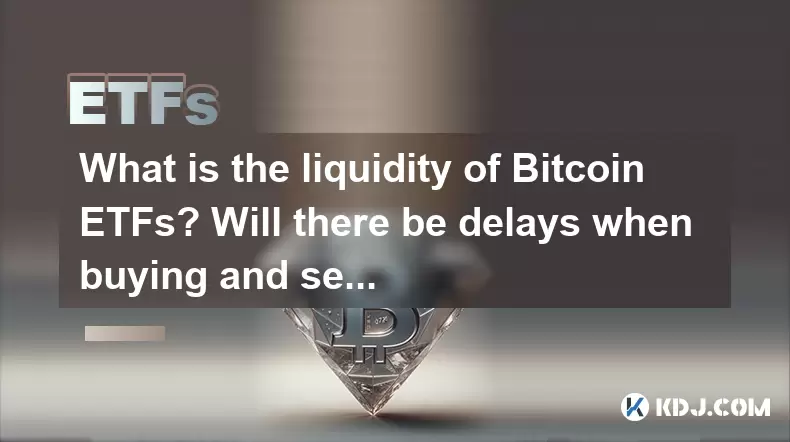
Understanding Bitcoin ETFs and Their Role in the Market
Bitcoin Exchange-Traded Funds (ETFs) are investment vehicles that track the price of Bitcoin without requiring investors to directly own the cryptocurrency. These funds are traded on traditional stock exchanges, offering a more accessible way for retail and institutional investors to gain exposure to Bitcoin. The liquidity of Bitcoin ETFs is a crucial factor for traders who prioritize quick entry and exit from positions. Unlike direct crypto trading, which occurs on decentralized or centralized exchanges, Bitcoin ETFs operate within regulated financial markets, potentially influencing their liquidity dynamics.
Liquidity refers to how easily an asset can be bought or sold without causing significant price movements. In the case of Bitcoin ETFs, this depends on several factors including market demand, fund size, and the efficiency of the underlying Bitcoin market.
Factors Affecting the Liquidity of Bitcoin ETFs
Several components determine how liquid a Bitcoin ETF is at any given time:
- Market Demand: If a large number of investors are actively buying or selling shares of the ETF, it enhances its liquidity. High demand leads to tighter bid-ask spreads and faster execution times.
- Fund Size: Larger ETFs with more assets under management typically have better liquidity because they can accommodate larger trades without affecting the price significantly.
- Underlying Asset Availability: Since Bitcoin ETFs are backed by actual Bitcoin holdings, the availability and accessibility of Bitcoin in the spot market influence how smoothly the ETF can be redeemed or created.
- Exchange Trading Hours: ETFs trade during regular market hours, unlike crypto exchanges which operate 24/7. This may create discrepancies between ETF prices and real-time Bitcoin prices, especially during high volatility periods outside market hours.
Will There Be Delays When Buying and Selling Bitcoin ETFs?
Trading Bitcoin ETFs follows the same settlement procedures as other stock-based investments. However, there are specific nuances due to the nature of these products:
- Execution Speed: During normal market conditions, buy and sell orders for Bitcoin ETFs are executed almost instantly, similar to stock trades. However, during periods of extreme volatility or low liquidity, delays may occur.
- Settlement Time: Most ETF trades settle in T+2 days (trade date plus two business days). This means even if you execute a trade today, the transaction officially completes two business days later.
- Market Gaps: Because Bitcoin ETFs only trade during market hours, there could be a gap between the closing price of the ETF and the opening price the next day, influenced by overnight changes in Bitcoin’s price on global exchanges.
How Do Bitcoin ETFs Compare to Direct Crypto Trading?
Investors often compare Bitcoin ETFs with direct ownership of Bitcoin through crypto exchanges. Each method has distinct advantages and disadvantages regarding liquidity and execution speed:
- Direct Crypto Trading: Offers 24/7 access and potentially higher liquidity depending on the exchange used. However, it requires managing private keys, dealing with exchange risks, and understanding wallet operations.
- Bitcoin ETFs: Provide a familiar interface for traditional investors, backed by custodial services. They offer regulatory oversight and ease of use but come with market hours limitations and potential tracking errors relative to Bitcoin’s actual price.
What Investors Should Consider Before Trading Bitcoin ETFs?
Before engaging in Bitcoin ETF trading, investors should evaluate several aspects to ensure they align with their investment strategy:
- Track Record: Examine the historical performance and trading volume of the ETF to assess its liquidity and reliability.
- Premium or Discount to NAV: Check whether the ETF frequently trades at a premium or discount to its net asset value, which can affect returns.
- Fee Structure: Understand the expense ratio and any additional fees involved in holding the ETF over time.
- Market Conditions: Be aware of broader market trends and how they might impact ETF liquidity, particularly during economic uncertainty or regulatory developments.
Frequently Asked Questions
Q1: Can I trade Bitcoin ETFs outside of regular market hours?
No, Bitcoin ETFs are listed on traditional stock exchanges and can only be traded during standard market hours, usually 9:30 AM to 4:00 PM Eastern Time on weekdays.
Q2: Are Bitcoin ETFs safer than holding Bitcoin directly?
Bitcoin ETFs eliminate the need to manage private keys and reduce counterparty risk associated with crypto exchanges. However, they introduce market risk and reliance on the fund provider's integrity.
Q3: How do Bitcoin ETFs handle dividends or staking rewards?
Bitcoin ETFs do not generate income like dividend-paying stocks. Some newer ETF structures may offer yield through lending mechanisms, but this varies by product and issuer.
Q4: What happens if the Bitcoin ETF provider goes bankrupt?
In most cases, investor assets are held separately from the fund provider’s balance sheet. Regulatory frameworks aim to protect investors, but it’s important to review the ETF’s prospectus and custodial arrangements carefully.
Disclaimer:info@kdj.com
The information provided is not trading advice. kdj.com does not assume any responsibility for any investments made based on the information provided in this article. Cryptocurrencies are highly volatile and it is highly recommended that you invest with caution after thorough research!
If you believe that the content used on this website infringes your copyright, please contact us immediately (info@kdj.com) and we will delete it promptly.
- FTX Token's Wild Ride: FTT Drop Amidst Creditor Repayment Buzz
- 2025-08-02 01:30:12
- Navigating the Crypto Market: Bitcoin, Trader Experience, and Avoiding the Noise
- 2025-08-02 00:50:12
- Deep Agents, AI Task Management, and Evolution AI: A New Era?
- 2025-08-02 00:50:12
- SPX6900, BlockDAG, and Miner Sales: A New York Minute on Crypto Trends
- 2025-08-01 23:30:15
- BlackRock, XRP ETF, and Ripple: Is the Perfect Storm Brewing?
- 2025-08-01 22:50:11
- Solana ETF Momentum Builds: Will SOL Join the Institutional Party?
- 2025-08-02 00:10:15
Related knowledge
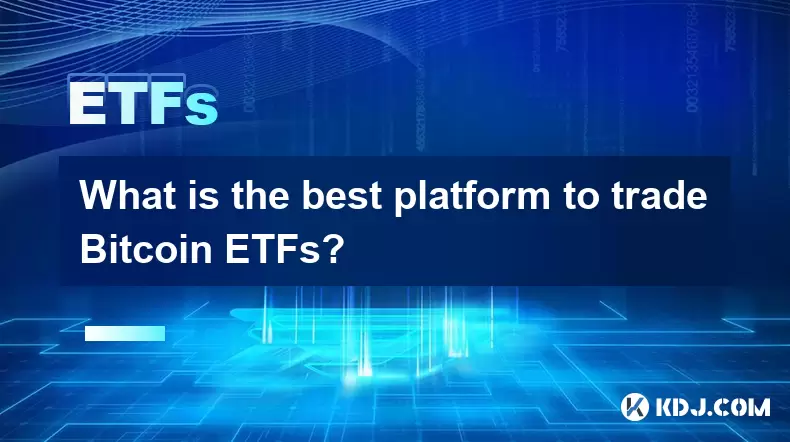
What is the best platform to trade Bitcoin ETFs?
Jul 23,2025 at 04:14am
Understanding Bitcoin ETFs and Their Role in TradingBitcoin Exchange-Traded Funds (ETFs) have gained significant traction among traditional and crypto...
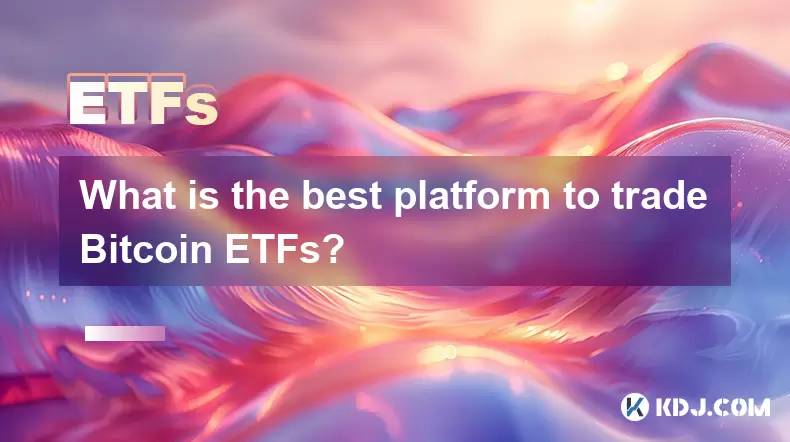
What is the best platform to trade Bitcoin ETFs?
Jul 17,2025 at 03:50pm
Understanding Bitcoin ETFs and Their Role in the MarketBitcoin Exchange-Traded Funds (ETFs) are investment vehicles that track the price of Bitcoin wi...
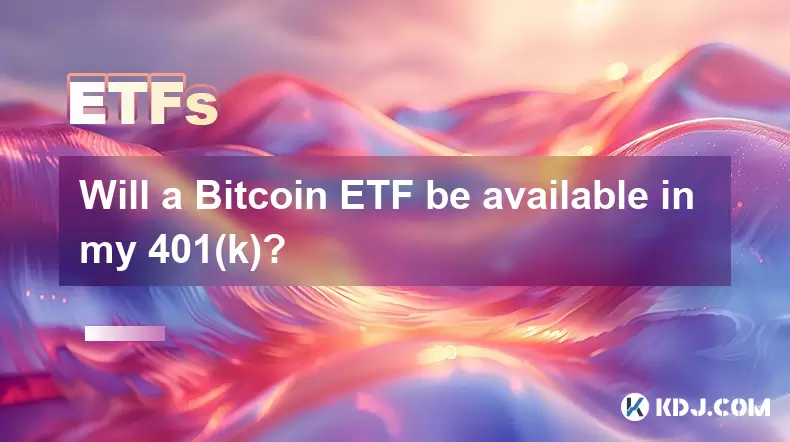
Will a Bitcoin ETF be available in my 401(k)?
Jul 17,2025 at 10:42pm
What is a Bitcoin ETF?A Bitcoin ETF (Exchange-Traded Fund) is an investment vehicle that tracks the price of Bitcoin without requiring investors to di...
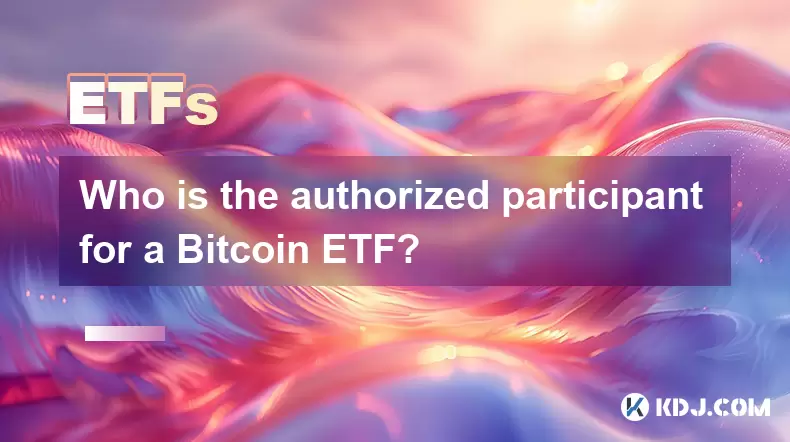
Who is the authorized participant for a Bitcoin ETF?
Jul 18,2025 at 12:42am
Understanding the Role of Authorized Participants in Bitcoin ETFsIn the context of Bitcoin Exchange-Traded Funds (ETFs), an authorized participant (AP...
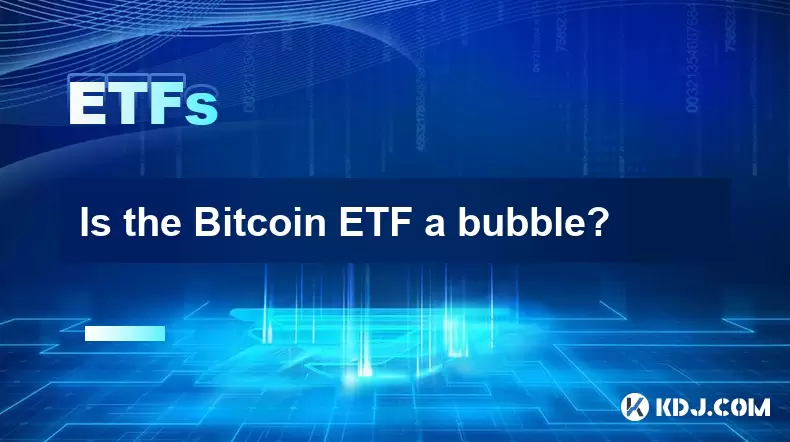
Is the Bitcoin ETF a bubble?
Jul 20,2025 at 06:57am
Understanding the Bitcoin ETF ConceptA Bitcoin Exchange-Traded Fund (ETF) is a financial product that aims to track the price of Bitcoin without requi...
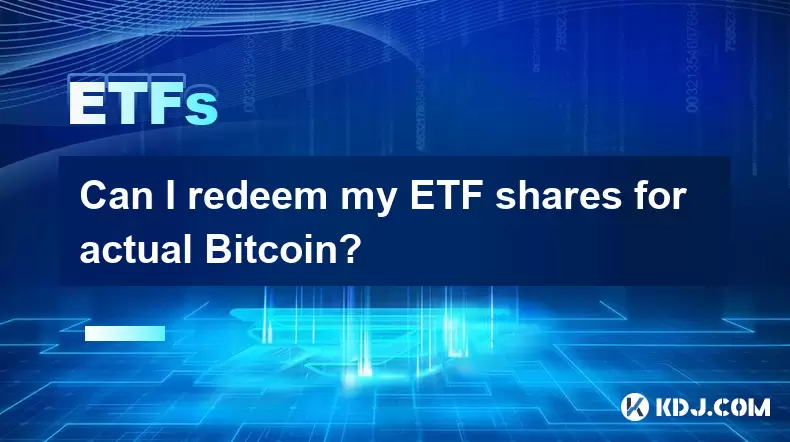
Can I redeem my ETF shares for actual Bitcoin?
Jul 17,2025 at 03:14pm
Understanding ETF Shares and Their Relation to BitcoinExchange-Traded Funds (ETFs) have become a popular investment vehicle for those looking to gain ...

What is the best platform to trade Bitcoin ETFs?
Jul 23,2025 at 04:14am
Understanding Bitcoin ETFs and Their Role in TradingBitcoin Exchange-Traded Funds (ETFs) have gained significant traction among traditional and crypto...

What is the best platform to trade Bitcoin ETFs?
Jul 17,2025 at 03:50pm
Understanding Bitcoin ETFs and Their Role in the MarketBitcoin Exchange-Traded Funds (ETFs) are investment vehicles that track the price of Bitcoin wi...

Will a Bitcoin ETF be available in my 401(k)?
Jul 17,2025 at 10:42pm
What is a Bitcoin ETF?A Bitcoin ETF (Exchange-Traded Fund) is an investment vehicle that tracks the price of Bitcoin without requiring investors to di...

Who is the authorized participant for a Bitcoin ETF?
Jul 18,2025 at 12:42am
Understanding the Role of Authorized Participants in Bitcoin ETFsIn the context of Bitcoin Exchange-Traded Funds (ETFs), an authorized participant (AP...

Is the Bitcoin ETF a bubble?
Jul 20,2025 at 06:57am
Understanding the Bitcoin ETF ConceptA Bitcoin Exchange-Traded Fund (ETF) is a financial product that aims to track the price of Bitcoin without requi...

Can I redeem my ETF shares for actual Bitcoin?
Jul 17,2025 at 03:14pm
Understanding ETF Shares and Their Relation to BitcoinExchange-Traded Funds (ETFs) have become a popular investment vehicle for those looking to gain ...
See all articles


























